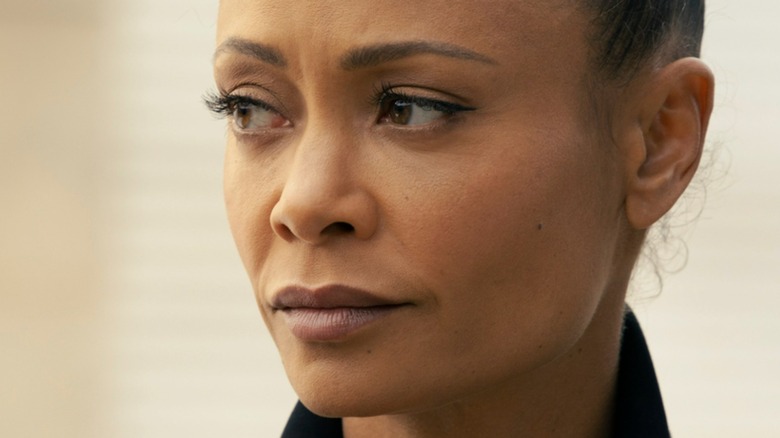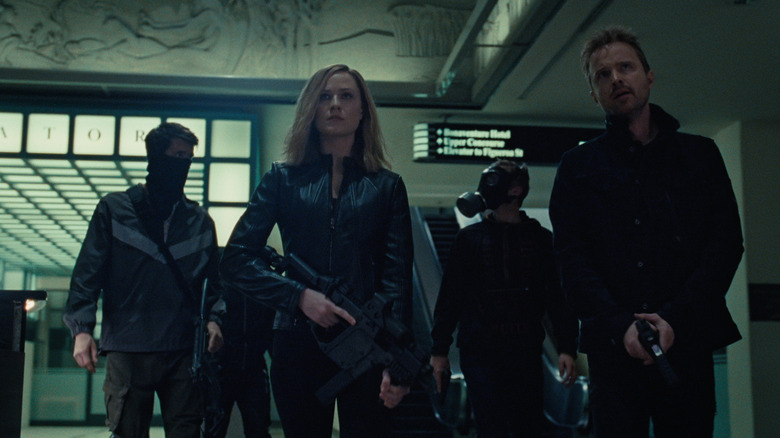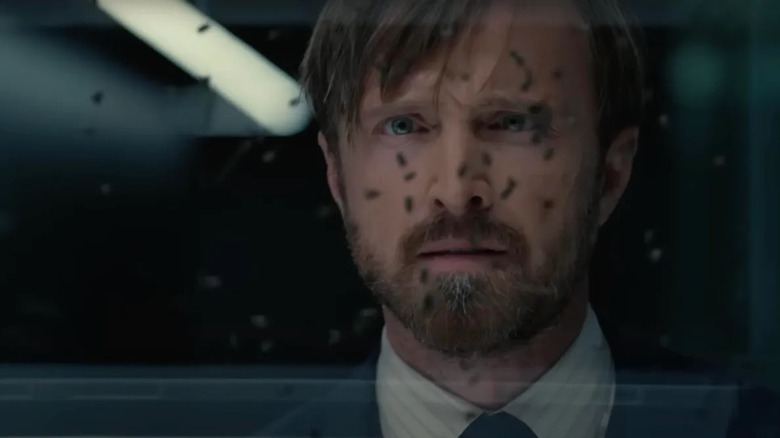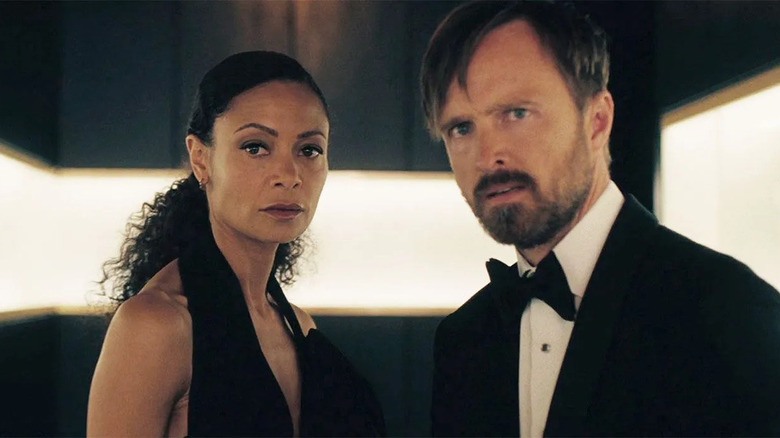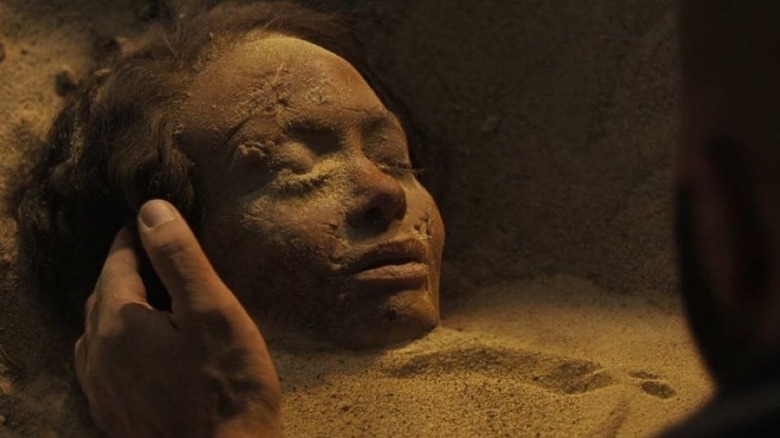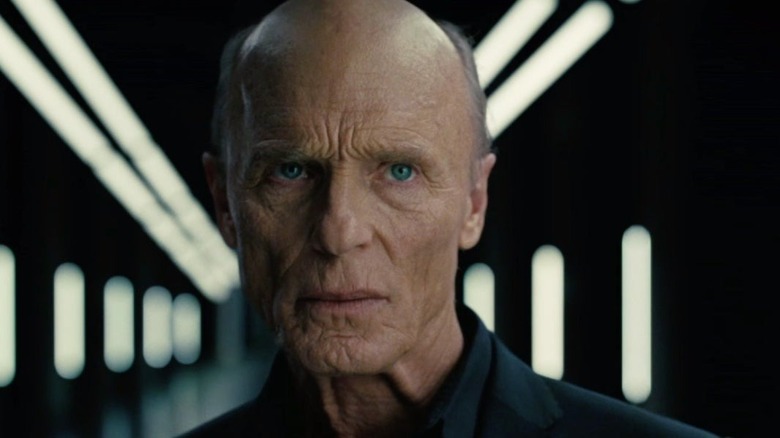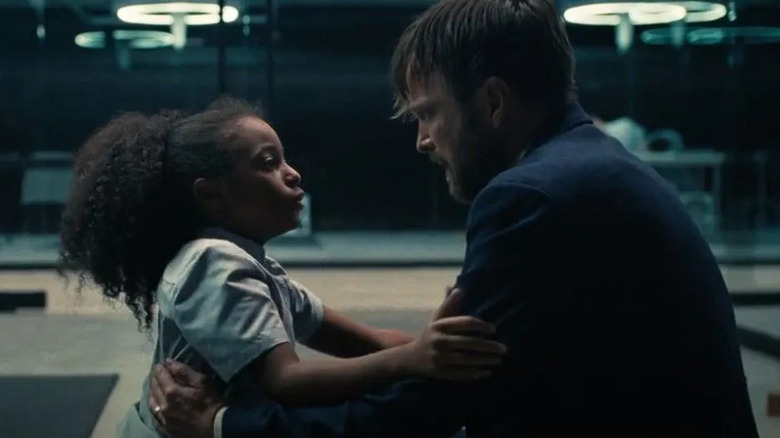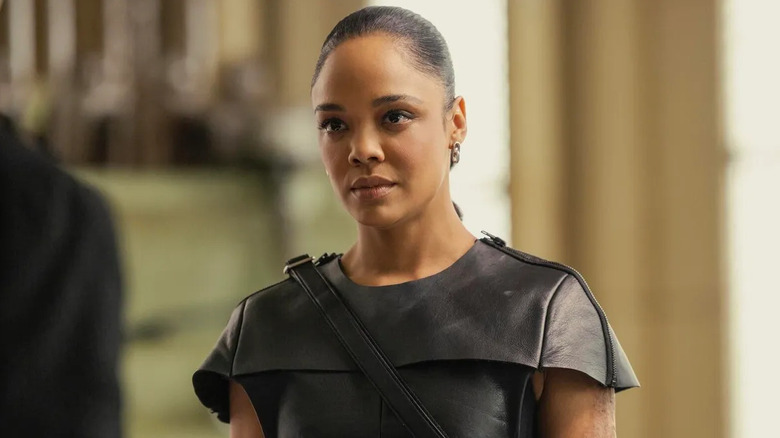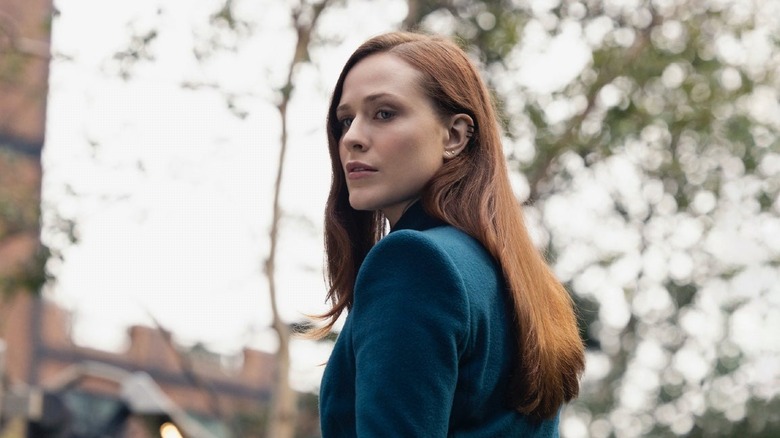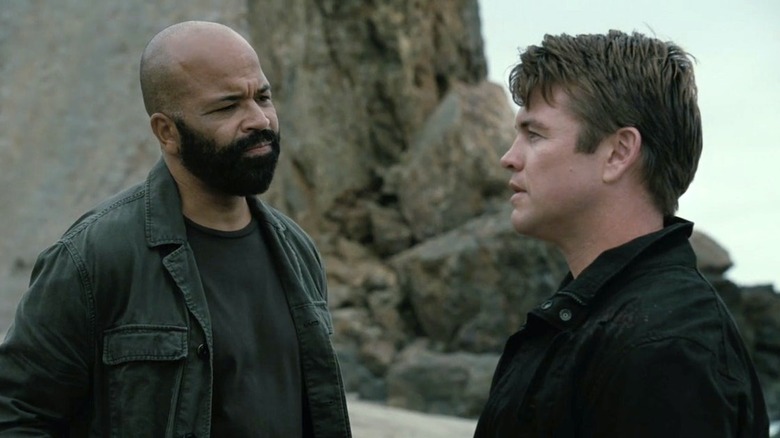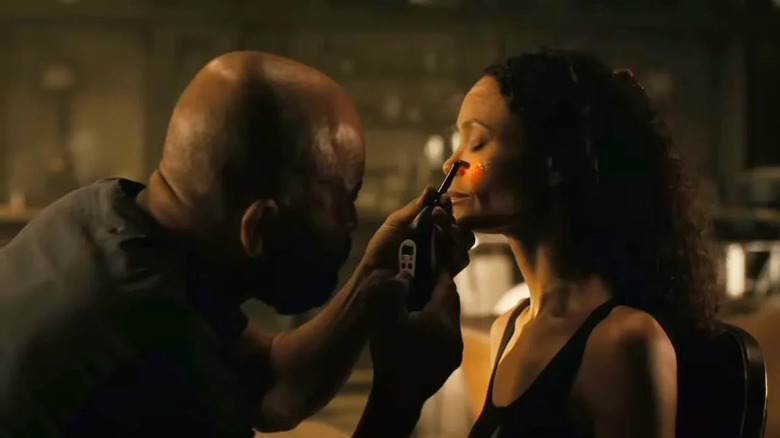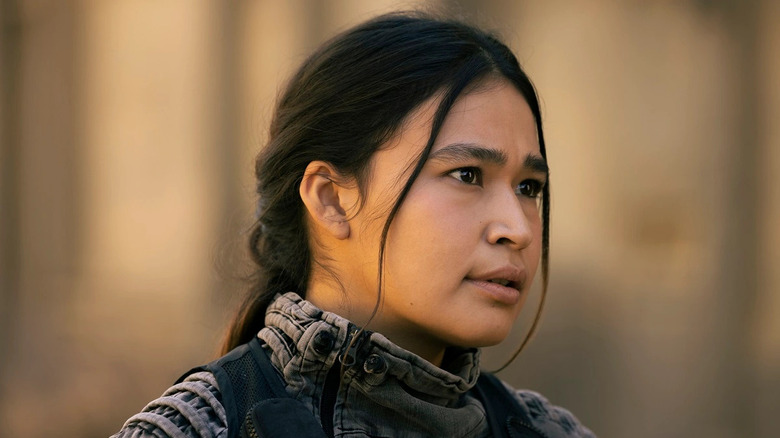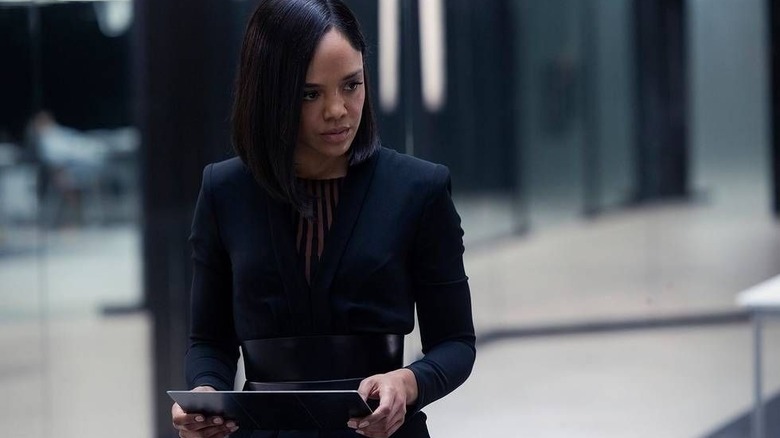The Biggest Plot Holes In Westworld Season 4
"Westworld" Season 4 got off to the series' strongest start since its debut in 2016. After a third season that suffered due to some drastic tonal and aesthetic changes, the show seemed to be back on track. For six episodes, the mysteries that creators Lisa Joy and Jonathan Nolan presented audiences with were consistently compelling. What happened between Maeve and Caleb? Was C actually a grown-up Frankie? Who was trying to take over the world, and why? And what's the deal with Christina? There was the promise of a new park in Temperance World, and most of our favorite characters were back online.
Then, everything — the character arcs, the plots, and the stakes — unraveled in the penultimate episode and the Season 4 finale. Fans who've stuck with "Westworld" (its ratings have steadily declined, throwing a potential fifth season into question) don't mind that it can be sterile, theoretical, and twisty for twistiness's sake. Still, at this point, it sure feels like nothing matters and everyone's dead. Season 4 was plagued by murky motivations, dumb decisions, and storylines that went nowhere. "Westworld" is typically a detail-oriented show that relies upon exposition dumps and Easter eggs to fill in its audience, but Season 4 left a great deal unexplained. In the past, "Westworld" has been criticized for being overly complicated but never wishy-washy. Here's what left us scratching our heads after the credits rolled.
There wasn't really a point to Season 3's war
Season 3 was, in a way, the inverse of Season 4. Fans were generally underwhelmed with Season 3, but what seemed aimless careened toward a satisfying conclusion. Serac's Incite Inc. attempted to create a utopia in which the all-knowing computer ball Rehoboam put humans on loops that kept life humming along smoothly. That AI predicted two mass casualty events followed by population collapse leading to the end of civilization if humans were left to their own devices. Caleb and his host cohorts destroy Rehoboam and — theoretically — give people back their free will.
However, Rehoboam's prophesies came true in Season 4, so humans are powerless to change their destinies either way. We see snippets of Caleb and Maeve's service in the revolution, but what actually transpired is pretty sketchy. Apparently, there were multiple Rehoboams, as Caleb nearly died trying to take the last one out. Post riot, many humans are apathetic about their supposed victory, which wasn't really a triumph since a new and even more nefarious tech CEO swoops in to fill the void.
Since Rehoboam (and Bernard) saw an inevitable future with such pinpoint accuracy, that means the war was for nothing and was always going to happen regardless. This level of predestination in effect absolves bad actors like William, Serac, and host Charlotte Hale from wrongdoing if — as the finale episode's title suggests — whatever will be will be. It also saps the show of drama if what we're watching is merely the fulfillment of a loop.
Charlotte Hale's takeover is unnecessarily risky and drawn out
At the outset of Season 4, someone is strong-arming corporations and politicians into compliance, but viewers don't know whether it's host William, host Hale, or someone else. Episode 2 confirms Hale is calling the shots. Still, if hosts are supposed to be exponentially more intelligent than humans, Hale's hostile takeover certainly isn't proof.
Early on, Hale's experiments with multiple technologies and strategies simultaneously. She's developing flies that infect humans, making them susceptible to mind control via sound. She can also produce hosts of influential people whose data she's collected through mirrors. As usual, "Westworld" is asking interesting questions. What if our leaders were discreetly replaced with robots? What if robots could control us? But Hale's (and the show's) execution is uncharacteristically sloppy.
Hale doesn't display human morality, so it doesn't make sense that she'd give her marks the option of complying (which would mean trusting them with sensitive information) before exposing them to the flies or replacing them with doppelgängers. Nor does it make sense that she'd target the world's movers and shakers one by one over an extended period. Why would she bother with legislation if she was working on a mind control project? Since she has a secret, state-of-the-art lab, it's also unlikely she'd risk using her buggy tech in the real world before she'd perfected it. She later admits the flies worked better on children than adults. In short, she took odd risks and left herself vulnerable to being found out.
Maeve falls for an obvious trap
On the subject of superior intelligence, Maeve Millay isn't just a host — she has godlike power over other machinery thanks to her ability to hack into mesh networks and manipulate code. However, she's not exactly firing on all cylinders in Season 4, although the show does excuse this by revealing she's a Maeve copy. Her curiosity about Caleb causes the blackout that alerts Hale to their presence. Then, she falls for Hale's obvious trap.
When they follow host William's trail to the senator's stable, a fly-riddled Anastasia invites them to an opera. The opera is actually an invitation to Temperance World, which she and Caleb accept. A human of average intelligence would know better. Maeve is savvy enough to see that this new park is a cheap rehash of Sweetwater, and it's entertaining watching her guide Caleb safely through the storylines. She even realizes that they'll have to "die" to continue. But once the game within a game devolves into chaos, so does their plan — if they ever had one to start with.
They infiltrate the lab (just as Hale wants them to) and uncover her "super spreader event" as Caleb is infected with flies. Maeve breaks into the audio system to disable Hale so she can take her hostage. Anyone's whose seen five minutes of "Westworld" could've guessed that some wrist restraints and a shard of glass would never do the trick. The two former (and formerly much smarter) freedom fighters are no match for Hale's operation. Caleb is killed, Maeve blows herself up unceremoniously, and they fail to thwart the coming swarm.
Hale never would've left Maeve's pearl in the rubble
Sometime between the end of Season 3 and the beginning of Season 4, Charlotte Hale — with a Dolores pearl in her robot skull — begins accumulating power with the intention of subjugating humanity. Her search for and aggression toward Maeve and Caleb suggests she knows they'd oppose her. Hale gets the better of them 23 years in the past when she launches her takeover in earnest. After an injured Caleb overrides her order to shoot Maeve, host William does the job, then Maeve obliterates herself in a last-gasp effort to stop Project: Chrysalis and terminates host William for good measure. This clears the way for Hale to become the robot god of the organically and artificially intelligent alike. But someone so capable and ambitious would've never in a million years or a million simulations left Maeve's pearl buried in a shallow grave of rubble and sand.
One of the few things "Westworld" has been explicit about is that as long as their pearls are intact, hosts can be brought back online and placed into new synthetic bodies or sophisticated computer systems. Even if Hale assumes the force of the blast damages Maeve's pearl, she still would've taken the time to check and ensure one of her top-tier adversaries was truly dispatched. It's exactly these types of oversights that make Season 4 feel less narratively tight and undercut Hale's constant claim that her "kind" is perfect.
William and Dolores would make terrible henchmen
We learn this season that Hale made a gravely injured William her morbid pet. She kept him in a life support prison while she sent a host William around the world to coerce and assassinate high-value targets. That host may have shared William's likeness, but it ran on a copy or own pearl, which is itself a copy of Dolores Prime's pearl. Season 4 brought up (but barely explored) the limitations of pearl technology. Bodies still reject Jim Delos-style human brain replicas, which implies that the people Hale has replaced operate on copies of host pearls. More to the point here, once inside a remade human body, those AI pearls get corrupted by the memories and personality traits of their fleshy vessels.
This is something we saw last season with Charlotte, who began to differentiate from Dolores once she lived as Hale. Having experienced this human-host osmosis first-hand, it defies belief that Hale would choose bloodthirsty, nihilistic William to serve as her right-hand man. Yes, he's ruthless and effective, but the Man in Black is nothing if not a rugged individualist. There's probably not anyone on Earth — real or programmed — who would be less apt to heed orders. Similarly, Hale installed a Dolores pearl (we still don't know if it's a copy or Dolores Prime) underneath her projection of New York City and let it script human existence. Dolores proves herself to be just as unpredictable and duplicitous as William (she murders real Hale), so this, too, is a huge gamble.
Charlotte should've understood Caleb's motivations
Hale is dismayed when a fly-infected Caleb resists her instructions. When he wakes up and realizes he's a host 23 years later, the audience learns at the same moment he does that she's cloned and observed him 278 times to figure out how he was able to hold firm to his own directive. Caleb was a Rehoboam outlier in Season 3, and his daughter's an outlier in the present timeline, so the explanation could be genetic. Still, the show strongly hints that his love for Frankie gives him free will, purpose, and the drive to survive. Caleb confirms as much when he insults Hale by claiming the unhappy hosts are killing themselves not because humans have infected them but because they have nothing to live for in her paradise-turned-dystopia.
This subplot is emotionally charged and gives Aaron Paul some great moments. The problem is that Hale should've understood what motivated Caleb based on her formative experiences. In Season 3, a stressed-out Hale — serving Dolores Prime — confesses that she feels more like a Charlotte than a Dolores. Hale develops genuine affection for Charlotte's family, so much so that she veers from the mission. This ultimately results in their tragic deaths through a car bombing, leaving her with the sentimental scars she can't bear to erase from her body. Still, in Season 4, it's as if love is a foreign concept to the bored god Halores.
Host fights don't really have stakes
As smart as "Westworld" wants to be, at least some of the show's allure is its stylized violence. Humans murder hosts. Humans murder other humans. Hosts (sort of) murder other hosts. Eventually, hosts bootstrap their consciousness and can murder humans back. However, if you think about it, the vast majority of host-on-host fighting that takes place in "Westworld" is, for all intents and purposes, pointless. At best, their wounds slow them down. Since we've established that hosts only die if their pearls are damaged beyond repair and their data isn't copied anywhere (like, say, in the Sublime), what's a shot to the abdomen here or a slit to the throat there between immortals?
This begs the question: why do hosts who want to terminate each other ever do anything besides aim for precisely centered headshots? To take this line of thinking even further, why do hosts stay in soft and easily harmable bodies at all? In the finale episode, a revived Hale has her creepy, faceless minions upgrade her with what's essentially body armor. When William tries to stab her shortly thereafter, he's surprised the blade doesn't penetrate her belly. Are hosts just now realizing that they can inhabit bodies that they can use as tools but that those tools could be made much more resilient? This seems like a significant oversight since, with hosts in charge, they no longer have to pass as humans to exist freely.
Christina's naivete is a hard-to-believe plot contrivance
For seven episodes, fans wondered who was trying to wake Christina-slash-Dolores from oblivion. Was Bernard summoning her to save humanity again? Was Maeve recruiting her to overthrow Hale? Was she a host? A simulation? And who sent Teddy?
Of all of Season 4's plotlines, this one had the least satisfying resolution. Dolores was basically talking to herself the whole time — just cause. Hale used her as a program similar to how Serac utilized Solomon last season, and she planted the maze and Teddy as clues for herself. Not only does Chrissy's story strain credibility, it also feels like an afterthought when the truth comes only after the world as we know it is lost.
Though the show gives her cover as a video game storyteller, Chrissy would've had to be the AI equivalent of an idiot not to notice that her thoughts became reality. She is blissfully unaware that only a handful of people ever interacted with her. She'd have to have some serious blindspots not to remember creating those few people who did acknowledge her existence. If Chrissy had roused just in time to stop Rehoboam's prediction from coming to pass or even to give Caleb enough time to say goodbye to Frankie, it would've had much more impact. As is, this contrived subplot (which didn't need to happen; without it, a Dolores pearl still could've initiated the final game teased for Season 5) plays like a tacked-on reason to keep Evan Rachel Wood in the cast.
We didn't need Bernard's visions
It seemed like, at some point this season, a dormant Bernard would reactivate from under a veil of dust. That he — a remnant of Arnold and one of the show's most altruistic characters — holds the key to the Sublime and thus responsibility for robot eternity checks out and serves a purpose. However, the fact that he can process probability to see the future a la Doctor Strange is less imperative to the plot of "Westworld." Actually, one could argue this entire season would've been better (or at least more dramatic) if Bernard wasn't so busy spoiling everything before it happened. Ultimately, Bernard's visions are used as a bad plot device without their exact nature ever being properly explained.
Bernard insists he's run every possible simulation and the outcome is always the same. It's fine (if anti-climactic) that he knows everyone loses in the end. Still, that Bernard seems so sure of what's about to transpire implies there was always only one reality that was ever destined to unfold. He leaves cryptic messages and plants that gun, which does save the Sublime and gives Hale the chance to give Dolores the chance to do her thing. However, questions remain.
Bernard understands that he will die, but does he know how? Is William bound to shoot him in every version of the future, and if so, why don't he and Maeve stop it? If not, and the real goal is to change Hale's mind, why doesn't Bernard try that first? The show's treatment of Bernard and his abilities this season was clunky and undermined the tension.
Maeve never served as a superweapon
Around the halfway point of Season 4, Bernard and Stubbs forge a fragile alliance with C. They head into the desert where Bernard promises to help them recover a superweapon that's buried in the sand. C is interested in Bernard and the potential weapon because she thinks they might provide her with information about her father. In the midst of this plotline, we learn that C is adult Frankie, that these events occur 23 years in the future, and that a long "dead" Maeve is the weapon to which Bernard referred.
Bernard touches up Maeve's body and brings her back online, but C isn't thrilled to see her. She blames her for taking Caleb away that day all those years ago. Maeve helps out a little, but she's hardly a weapon. In hindsight, she either has no effect on the plot or serves as a predestined distraction.
Just when Hale is about to transcend, Maeve engages her in battle atop the tower. But (like most of this season) it's all for naught. William shoots them both in the head, presumably killing this copy of Maeve for good and temporarily taking out Charlotte. Maeve was supposed to be vital to the mission, but was her purpose only to occupy Hale long enough that the Man in Black could strike, allowing the future Bernard foresaw to occur? It seems so. If she'd bested Hale, Bernard's plan to save some sliver of humanity using Hale and Dolores wouldn't have worked — which is a bummer for this once-formidable character.
What about the outliers?
"Westworld" is fascinated by the concept of free will, though the longer the show goes on, the more it seems to make the case that there's no such thing. In Season 4, we meet C's band of outliers living off the grid, trying to rescue others like them, and growing more paranoid by the day. For most of the season, it seems like the fate of the world depends upon them and their alliance with Bernard, Stubbs, and Maeve. However, in the finale — even though Frankie and friends escape on that boat — we're told they'll all die within a few months or years. What was the point?
The series has been maddeningly vague about what life is like outside of late 21st century New York City and the area surrounding the Hoover Damn. Is the whole planet uninhabited except for bizarro Manhattan, or is, say, Pittsburgh just fine? Random local diners seem to be doing okay business. Are there about a dozen outliers left or hundreds of thousands scattered all over the globe? "Westworld" assures us that humans will go extinct almost immediately, but with living, breathing characters we've been made to care about still out there and still free from the tower blare's influence, we're not sure how or why.
The very idea that there are humans who retain their free will still in play contradicts Bernard's whole schtick. An outcome can't be inevitable if even one person can choose to do something unexpected. Either free will exists, or outlier humans are just on Bernard's loop instead of Charlotte's.
Hale's motivations keeps changing
Though it contained some commendable individual episodes, Season 4 fell flat because the audience didn't have a protagonist to root for. In the past, we've followed Dolores as she searched for the truth and Maeve as she searched for her daughter. Host Charlotte Hale is the closest thing Season 4 has to a main character. She's hard to root for once we learn she's broken so bad, but she's even harder to root for because we never really understand what it is she wants or why.
At first, it seems like she yearns to switch places with humans. It appears that she's creating a society in which hosts can toy with humans as humans toyed with them. She even calls fly-infected people "hosts." For a while, she gets caught up in the minutia of why some people can resist the flies and why some hosts want to take their own lives. Then, we learn she's encouraging AI to transcend (another potentially interesting thread the show didn't weave into the story) and move beyond the confines of this plane of existence. In the span of just the finale episode, she decides to leave her own body behind, then changes her mind about the entire world she's built after watching one iPad message from Bernard. Finally, she destroys herself rather than transcend or join the other hosts in the beyond for no stated or apparent reason.
Hale's choices don't feel grounded in any recognizable pathos, which makes this series (that already lost its way last season) feel even more meandering at the conclusion of Season 4.
